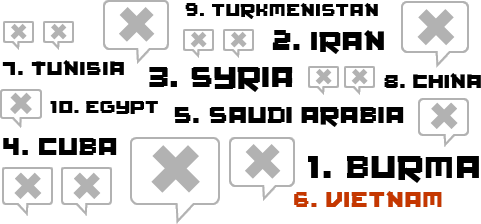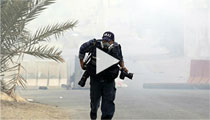Vietnam intensified its grip on old and new media through a campaign of censorship, surveillance, and imprisonments. Central Propaganda Department officials held weekly meetings with top newspaper editors, outlining news agendas and identifying banned topics. The list of prohibited topics expanded to include criticism of the government’s economic management, land conflicts between the state and local communities, and the business dealings of the prime minister’s daughter, CPJ sources said. Courts handed down harsh prison sentences to six journalists in 2012. Nguyen Van Khuong, a reporter with the Vietnamese daily Tuoi Tre, was sentenced to four years in prison on trumped-up bribery charges filed after he investigated police corruption. Bloggers Dinh Dang Dinh and Le Thanh Tung were sentenced to six and five years respectively for postings deemed critical of the ruling Communist Party. Three other bloggers–Nguyen Van Hai, Ta Phong Tan, and Phan Thanh Hai–were sentenced to terms ranging from four to 12 years on anti-state charges related to their critical journalism. An executive decree pending in late year threatened a further clampdown on the Internet, including new prohibitions against pseudonymous or anonymous blogs. In a September directive, Prime Minister Nguyen Tan Dung called for police to identify and arrest contributors to three critical, politically oriented blogs that had been operated anonymously. The directive also ordered that the sites be blocked domestically.
Vietnam
» Authorities expand list of topics that newspapers are prohibited from covering.
» Pending executive decree threatens online security, targets anonymous bloggers.
Vietnam intensified its grip on old and new media through a campaign of censorship, surveillance, and imprisonments. Central Propaganda Department officials held weekly meetings with top newspaper editors, outlining news agendas and identifying banned topics. The list of prohibited topics expanded to include criticism of the government’s economic management, land conflicts between the state and local communities, and the business dealings of the prime minister’s daughter, CPJ sources said. Courts handed down harsh prison sentences to six journalists in 2012. Nguyen Van Khuong, a reporter with the Vietnamese daily Tuoi Tre, was sentenced to four years in prison on trumped-up bribery charges filed after he investigated police corruption. Bloggers Dinh Dang Dinh and Le Thanh Tung were sentenced to six and five years respectively for postings deemed critical of the ruling Communist Party. Three other bloggers–Nguyen Van Hai, Ta Phong Tan, and Phan Thanh Hai–were sentenced to terms ranging from four to 12 years on anti-state charges related to their critical journalism. An executive decree pending in late year threatened a further clampdown on the Internet, including new prohibitions against pseudonymous or anonymous blogs. In a September directive, Prime Minister Nguyen Tan Dung called for police to identify and arrest contributors to three critical, politically oriented blogs that had been operated anonymously. The directive also ordered that the sites be blocked domestically.
In each of the past several years, the authorities have ramped up their crackdown on critical journalists, focusing heavily on those who work online. All but one of the reporters imprisoned in 2012 published blogs or contributed to online news publications.
CPJ ranks Vietnam as the sixth worst country in the world to be a blogger. Detentions, harassment, and severely restrictive laws targeting the Internet have earned the country the designation.

A September 12 government directive singled out three political blogs for publishing news seen as anti-state. Officials were instructed to investigate and punish any bloggers found to contribute to the sites. The three sites were also blocked domestically as a result of the directive.
Dan Lam Bao
A collaborative blog edited and hosted outside Vietnam that relied on anonymous in-country contributors. Its title translates as "People Make the News."Quan Lam Bao
A collaborative, overseas-hosted blog that published material highly critical of Prime Minister Nguyen Tan Dung and his political associates. Its title translates as "Officials Make the News."Bein Dong
An overseas-hosted site that published nationalist-oriented content, including material critical of China and President Truong Tan Sang, a rival of Prime Minister Dung. Its title translates as "East Sea."Vietnamese bloggers have migrated to social media platforms such as Facebook in response to website censorship and surveillance. Vietnam's Facebook use jumped more than 40 percent over the prior year, reaching 9.8 million users, according to November 2012 data from Socialbakers, the social media analytics company.

